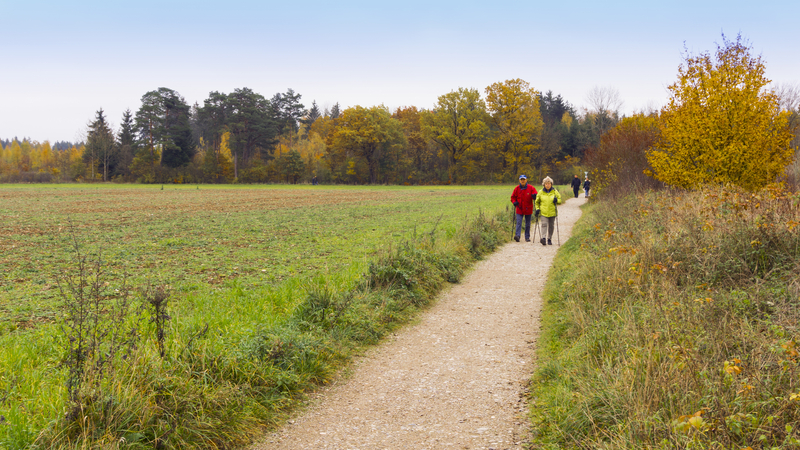The Open University and The Parks Trust have been working together on a joint project ‘The Keepmewalking Programme’ to investigate the barriers and facilitators to walking for people living with dementia and their carers.
We were trying to understand what works to keep people with dementia and their carers engaging with the walks and outdoor environments. Based on our previously published work (see also resources below), we know that sustained benefits come from regular engagement with activities, but this is challenging at many levels for people living with dementia and their families and carers. You can see more about the study here.
As we are aware spending time outdoors, walking, being present and mindful is crucially important for our physical and mental health and wellbeing (see more OpenLearn related resources below).
A crucial area for this study has been the 5 Ways Dementia Friendly Café in Milton Keynes. Running since 2019, the Café has been a useful place to assess the impact of walking on those affected by dementia, due to the Café’s inclusion of a guided walk. The Parks Trust and OU are working together to analyse how attendees interact with the walk.
In this article we’re reflecting on the experiences of Andrew, one of the Café’s volunteers. It is thanks to the generosity of local volunteers like Andrew that the Café and its activities have been so successful.
To set the scene, the Café is held at and hosted by volunteers from St. Andrew’s Church. The Church is located in Great Linford Manor Park, which is managed by The Parks Trust. The park has its own volunteers, the Friends of Great Linford Manor Park (FoGLMP), who work closely with The Parks Trust at activities and events, act as ambassadors for the park and are helping to make the park more dementia friendly by helping at initiatives such as the Café. Parks Trust staff also help at the Café and work with the Open University to facilitate their research.
Andrew, a member of FoGLMP, first became involved with the Café for reasons close to his heart - his mother lived with dementia and his father cared for her:
[The Café] was interesting to me…partly because I could see that her carer (my dad) would have benefitted from something like this
As Andrew explains, the Café isn’t just for those with dementia, it’s for their loved ones and those who support them.
As a retired NHS consultant, Andrew has good experience working with the elderly and wanted to give something back to the community. He is also recently retired and finds himself time-rich. Andrew’s job at the Café is to welcome visitors, promote conversation and create a friendly atmosphere, which he does to great success. Andrew is “open-minded about other suggestions for things to do”, and so his accompanying interest in the heritage of the park immediately outside the church led him to begin leading guided walks from the Café, an idea that has now become a mainstay.
The walk is gentle and suited to all who wish to take part on the day. It encourages reminiscence for those familiar with the local area or promotes new learning in those who aren’t. It is this walking element that the OU have been researching. All those involved in the Café and the OU agree, in the words of Andrew, that “attendees get a change of scenery, meet new people, a chance to reminisce and also realise that there are others who value this and share their outlook.” Andrew adds that “the tea and biscuits help too!”. Andrew has observed that the walking also increases the confidence of those living with dementia as it naturally prompts opportunities for casual discussion around the scenery and historic features of the park.
As the attendees have become more familiar with Andrew and the park, some have begun attending practical volunteering sessions outdoors with the Friends group. This is a huge success and something we will be encouraging in the future.
Before the Covid-19 pandemic we had just agreed to expand the Café to operate twice per month, thanks to its success and retention of regular attendees. More sessions would enable more people to access it and will provide more respite opportunities for carers. We asked Andrew how he envisages the Café operating in a post-Covid world:
“With those living with dementia, we had some regular attenders but some who only attended once. It would be nice to get more regular attenders… I think there is a need and interest with scope for expansion if promoted correctly.”
The OU and Parks Trust research team contunied and finished the research after the measures linking to Covid-19 pandemic were lifted.. We are currently in the process of publishing our findings. During the Covid-19 pandemic time we have co-designed and coproduces several resources that might be of interest to you. The Parks Trust and Open University have produced a free, self-guided resource, ‘The Spotter Sheet’ , for use out and about in the park (also see our article and podcast here). It’s a great companion to any walk. We have also created The Open University & The Parks Trust YouTube channel where we continue, to-date, to add podcasts jointly prepared and recorded with the Parks trust and BLMK Integrated Care System colleagues. There is still more work to be done to tackle the stigma associated with dementia and to provide greater support those impacted by the disease; this is what makes our research with the OU so valuable. You can read more about our study here or listen to our introductory podcast .









Rate and Review
Rate this article
Review this article
Log into OpenLearn to leave reviews and join in the conversation.
Article reviews